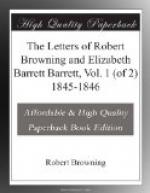But how I do wander!—I meant to say, and I will call myself back to say, that spring will really come some day I hope and believe, and the warm settled weather with it, and that then I shall be probably fitter for certain pleasures than I can appear even to myself now.
And, in the meantime, I seem to see ‘Luria’ instead of you; I have visions and dream dreams. And the ‘Soul’s Tragedy,’ which sounds to me like the step of a ghost of an old Drama! and you are not to think that I blaspheme the Drama, dear Mr. Browning; or that I ever thought of exhorting you to give up the ‘solemn robes’ and tread of the buskin. It is the theatre which vulgarises these things; the modern theatre in which we see no altar! where the thymele is replaced by the caprice of a popular actor. And also, I have a fancy that your great dramatic power would work more clearly and audibly in the less definite mould—but you ride your own faculty as Oceanus did his sea-horse, ‘directing it by your will’; and woe to the impertinence, which would dare to say ‘turn this way’ or ’turn from that way’—it should not be my impertinence. Do not think I blaspheme the Drama. I have gone through ‘all such reading as should never be read’ (that is, by women!), through my love of it on the contrary. And the dramatic faculty is strong in you—and therefore, as ’I speak unto a wise man, judge what I say.’
For myself and my own doings, you shall hear directly what I have been doing, and what I am about to do. Some years ago, as perhaps you may have heard, (but I hope not, for the fewer who hear of it the better)—some years ago, I translated or rather undid into English, the ‘Prometheus’ of AEschylus. To speak of this production moderately (not modestly), it is the most miserable of all miserable versions of the class. It was completed (in the first place) in thirteen days—the iambics thrown into blank verse, the lyrics into rhymed octosyllabics and the like,—and the whole together as cold as Caucasus, and as flat as the nearest plain. To account for this, the haste may be something; but if my mind had been properly awakened at the time, I might have made still more haste and done it better.




